If you have a tortoise that is not eating but it is sleeping a lot, you might be wondering if something is wrong. This is a common question that many tortoise owners have.
While the cause for this can be alarming, that is not always the case.
In this blog post, we will discuss six possible reasons why your tortoise may not be eating and is sleeping a lot.
- Key Takeaway
- 6 Reasons Why a Tortoise Is Not Eating And Sleeping a Lot
- Signs That a Tortoise Is Sick
- How Long Can a Tortoise Go Without Eating?
- What Should I Do If My Tortoise Stops Eating?
- When To Seek Veterinary Assistance For Tortoise That Is Sleeping and Not Eating
- FAQs
- Q: Why is my tortoise sleeping a lot?
- Q: How can I help my tortoise if it’s not eating enough?
- Q: What are some common reasons why a tortoise may not eat or sleep?
- Q: Can I bathe my tortoise if it’s not eating or sleeping?
- Q: What should I do if my pet turtle is not eating or sleeping?
- Q: How can I help my tortoise with its eating and sleeping habits?
- Q: What are some signs that my tortoise is sick?
- Conclusion and final thoughts
Key Takeaway
- A tortoise may not be eating and sleeping a lot due to several possible reasons, including environmental factors, improper diet, or an underlying health issue.
- Signs that a tortoise is sick include ocular and/or nasal discharge, closed or swollen eyelids, increased breathing effort, and open-mouthed breathing.
- If a tortoise stops eating, one should consider visiting a vet, providing a shallow bath in slightly warm water, reviewing the vivarium setup, and ensuring that the tortoise’s diet includes calcium and vitamin D3.
6 Reasons Why a Tortoise Is Not Eating And Sleeping a Lot
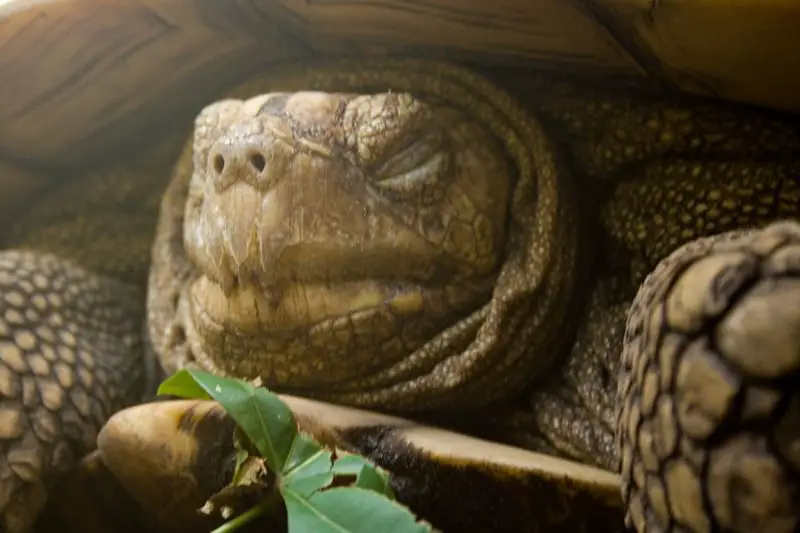
A tortoise is not eating and sleeping a lot due to hibernation, dehydration, lack of heat, poor diet, illness, or stress.
1. Could be trying to hibernate
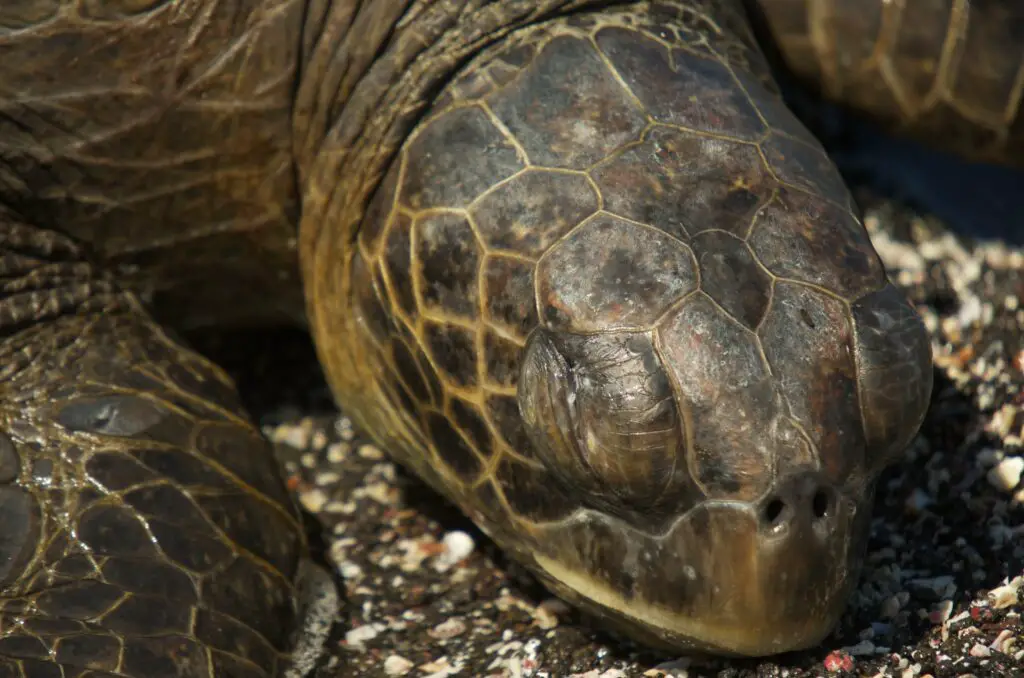
One possible reason your tortoise is not eating and sleeping a lot could be that it is trying to hibernate. Hibernation is a natural process where a reptile slows down its metabolism and becomes less active in order to conserve energy during the winter months.
Tortoises are reptiles that typically hibernate when the temperature drops below 50 degrees Fahrenheit. If your tortoise is not eating and has become less active, it could be a sign that it is trying to hibernate.
Tortoises are one of the oldest groups of land vertebrates, with a fossil record dating back over 200 million years.
Though they vary in size and shape, all tortoises share a number of features, including a hard shell that protects them from predators and the elements. Another common trait among tortoises is their ability to hibernate for long periods of time.
When conditions become too harsh to survive in, tortoises can burrow into the ground and enter a state of dormancy. During this time, their metabolic rate slows down and they cease to eat or drink.
Tortoises can remain in hibernation for several months at a time, emerging only when the weather becomes more hospitable. This ability to survive long periods without food or water makes tortoises one of the most resilient creatures on Earth.
2. Could be emerging from hibernation
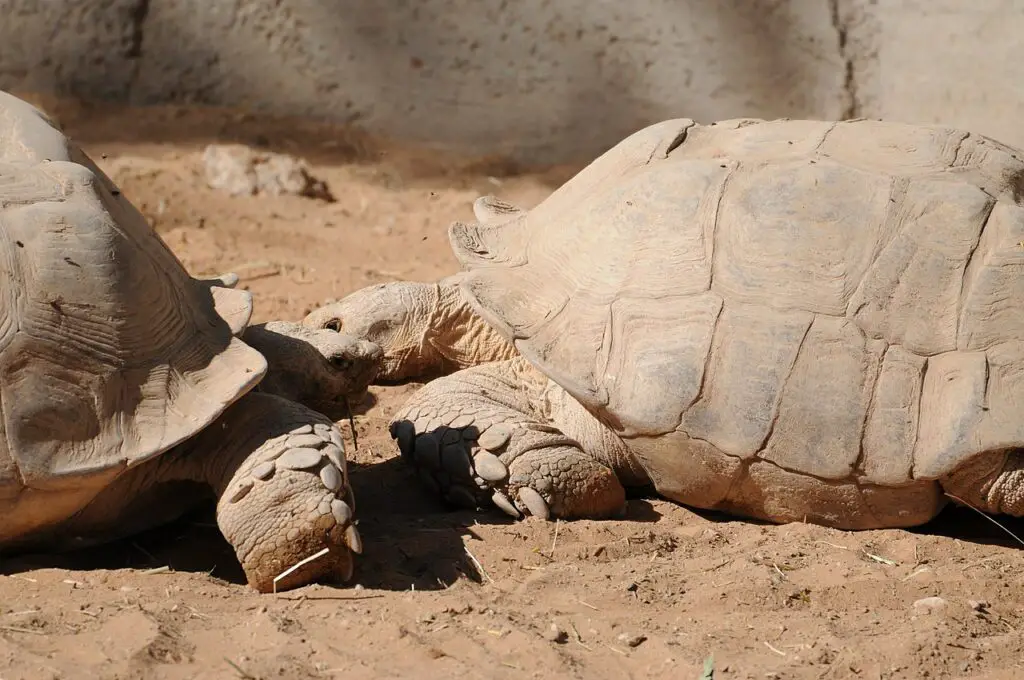
A tortoise may not be eating and starts sleeping a lot when it is emerging from hibernation. In the wild, tortoises typically hibernate for several months during the winter. During this time, they do not eat or drink, and they slow down their metabolism in order to conserve energy.
As the weather starts to warm up in the spring, tortoises gradually begin to wake up from their long sleep. At first, they may be sluggish and disoriented, and it may take them a few days to start eating and drinking again.
If your tortoise is not eating, it could be because it is still in the process of emerging from hibernation. Give it some time and make sure it has access to food and water, and it should eventually start to eat again.
3. Dehydrated
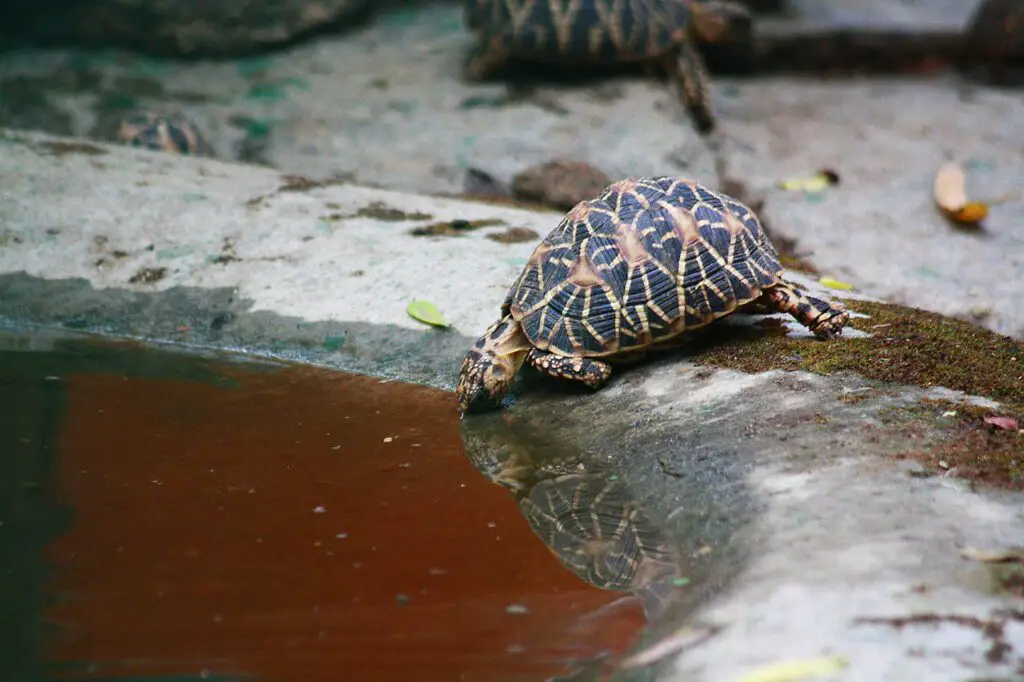
One common reason that tortoises may stop eating and start sleeping a lot is dehydration. In the wild, tortoises get most of their water from the plants they eat, but captive tortoises often do not have access to enough of these moisture-rich foods.
As a result, they can become dehydrated, which can lead to a loss of appetite.
Dehydration can also cause other health problems, such as shell rot and respiratory infections, so it is important to keep an eye on your tortoise’s water intake.
If you suspect that your tortoise is dehydrated, offer it a shallow dish of water or mist its enclosure with a spray bottle several times a day. You should also take it to the vet for a check-up to rule out any other possible causes of its lack of appetite.
4. Not enough heat
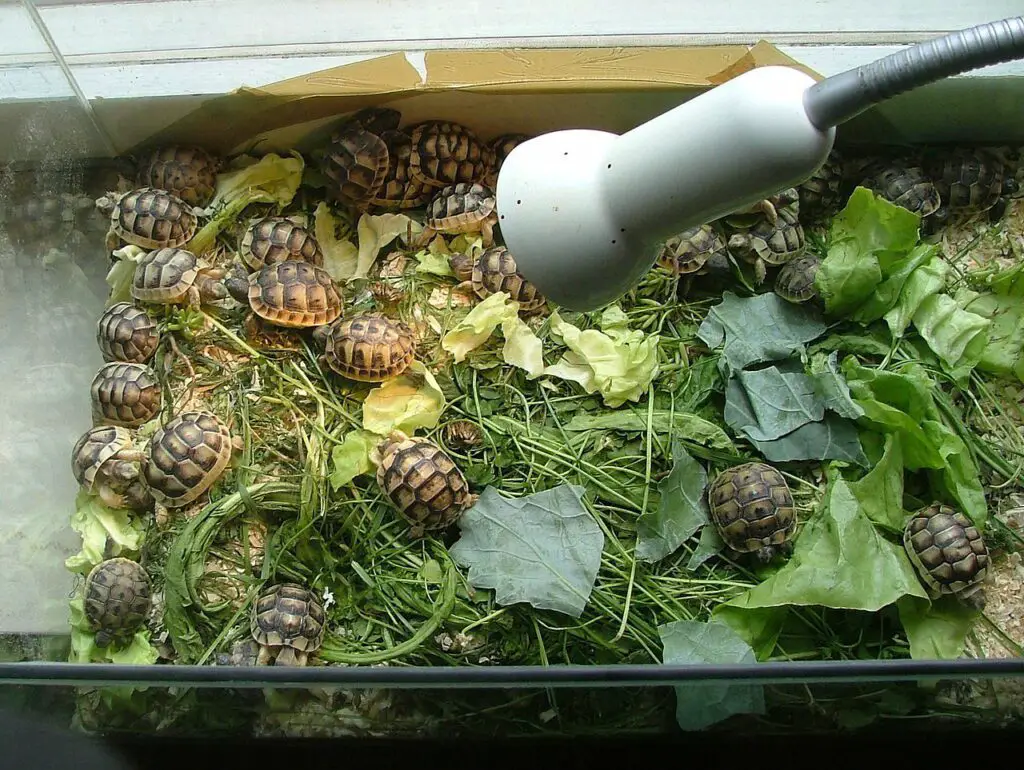
Another reason your tortoise may not be eating and sleeping a lot is that it isn’t getting enough heat. Tortoises are cold-blooded animals, so they rely on external sources of heat to regulate their body temperature.
If the temperature in their environment is too low, they will become sluggish and stop eating and if the temperature drops too low, it can even be fatal.
If you suspect that lack of heat may be the problem, try raising the temperature in your tortoise’s enclosure and see if that encourages it to start eating again. Some tortoises eat less during the cooler months of the year, and others may go through temporary periods of reduced appetite for no apparent reason.
Tortoises are cold-blooded animals, meaning that they rely on their environment to regulate their body temperature. In the wild, tortoises typically bask in the sun to warm up and find shelter in the shade to cool down. When it comes to captive tortoises, providing the right temperature range is essential for their health and well-being.
A tortoise enclosure should have a basking area that stays between 85 and 90 degrees Fahrenheit during the day and a cooler area that remains between 75 and 80 degrees at night. By providing a temperature gradient, you can create a comfortable environment for your tortoise to regulate its own body temperature.
5. Not enough lightning

One potential reason why your tortoise isn’t eating enough and is sleeping a lot could be because there isn’t enough lightning in its habitat.
Tortoises are ectotherms, meaning they rely on external sources of heat to regulate their body temperature.
Without enough light, they may become sluggish and less interested in food. If you suspect this is the case, try moving your tortoise’s habitat to a brighter location. You may also need to provide additional lighting, such as a basking lamp.
6. Worms
Pet tortoises could stop eating and start sleeping more if they have worms. Intestinal worms are a common problem in pet tortoises, and they can cause a loss of appetite.
If your tortoise has worms, you may notice other symptoms such as weight loss, lethargy, and diarrhea. If you suspect that your tortoise has worms, take it to the vet for a check-up.
The vet will be able to diagnose the problem and prescribe the appropriate treatment. In most cases, treatment is relatively straightforward and your tortoise should make a full recovery.
Just like any other pet, tortoises can fall victim to worms. There are four main types of worms that attack tortoises: roundworms, tapeworms, flatworms, and lungworms. Each type of worm is different and can cause different symptoms in your tortoise.
For instance, roundworms are the most common type of worm found in tortoises. They typically live in the intestines and feed off of the food that the tortoise eats. This can cause weight loss and anemia in your tortoise.
Tapeworms, on the other hand, generally attach themselves to the lining of the intestines and steal nutrients from the tortoise’s food. This can lead to malnutrition and intestinal blockages.
Flatworms are less common but can be just as dangerous as they can invade many different organs, including the lungs.
Lungworms are the least common type of worm but can be very harmful as they live in the respiratory system and make it difficult for the tortoise to breathe.
Signs That a Tortoise Is Sick
If you suspect that your tortoise is sick, keep an eye out for certain signs of illness, such as ocular and/or nasal discharge, closed or swollen eyelids, increased breathing effort, and open-mouthed breathing.
Ocular and/or Nasal Discharge
One of the most common signs of illness in tortoises is the presence of ocular and/or nasal discharge. This can include watery eyes, mucus or pus coming from the eyes or nose, or crusty residue around the eyes or nostrils.
Closed or Swollen Eyelids
Another sign of illness in tortoises is closed or swollen eyelids. A healthy tortoise should have bright and alert eyes, so if your pet’s eyes look puffy, inflamed, or swollen shut, it could be a sign of an underlying health issue.
Increased Breathing Effort
Tortoises typically breathe slowly and steadily, so if you notice that your pet is breathing heavily or has an increased breathing effort, it could be a sign of respiratory distress or infection.
Open-Mouthed Breathing
If your tortoise is breathing with its mouth open, it’s likely that it is experiencing some sort of respiratory distress. This could be caused by an upper respiratory infection, pneumonia, or other underlying health issues.
How Long Can a Tortoise Go Without Eating?
Depending on the tortoise’s age, health, and access to water, it can survive without food for three months to three years.
A tortoise’s ability to survive without food varies depending on its age, health, and access to water.
Tortoises have a slow metabolism and minimal energy requirements, allowing them to go long periods without food.
However, it’s important to note that deprivation of food for extended periods can have detrimental effects on a tortoise’s health.
As a veterinarian who has worked with reptiles and amphibians, I recommend ensuring your pet tortoise has access to clean water and a balanced diet to maintain its health and well-being.
If you have concerns regarding your tortoise’s eating habits, it’s important to schedule an appointment with a veterinarian who specializes in reptiles for proper diagnosis and treatment.
What Should I Do If My Tortoise Stops Eating?
If your tortoise stops eating, it’s crucial to act quickly and take appropriate steps to ensure its health and well-being.
Check the Environment
The first thing to do if your tortoise stops eating is to check its environment. Ensure that the enclosure’s temperature, humidity, and lighting are appropriate for your tortoise’s species.
Check the Diet
Tortoises need a balanced and nutrient-rich diet, and a lack of proper nutrition can cause them to lose their appetite. Check that your pet’s diet includes a variety of fresh vegetables, fruits, and protein sources such as insects or commercial tortoise food.
Observe Your Tortoise’s Behavior
Observe your tortoise’s behavior and look for signs of illness or stress, such as lethargy, lack of appetite, diarrhea, or abnormal behavior. Note any changes in behavior, such as hiding, aggression, or refusal to move.
Seek Veterinary Care
If your tortoise continues to refuse food, loses weight, or shows other signs of illness, seek veterinary care from a veterinarian who specializes in reptiles. The vet will perform a physical exam, run diagnostic tests, and prescribe appropriate treatment based on the diagnosis says Exotic Direct.
When To Seek Veterinary Assistance For Tortoise That Is Sleeping and Not Eating
If you have a tortoise that is sleeping and not eating, it’s important to seek veterinary assistance as soon as possible.
As a veterinarian who has worked with reptiles and amphibians for several years, I recommend seeking veterinary care if your tortoise is showing signs of illness such as lethargy, loss of appetite, and abnormal behavior.
These symptoms could be an indication of an underlying health issue that requires prompt medical attention.
When it comes to tortoises, there can be a number of reasons why they stop eating or become inactive, including environmental factors, improper diet, or illness.
In some cases, supplementing the tortoise’s diet with calcium and Vitamin D3 may be necessary.
However, it’s always best to consult with a veterinarian who specializes in reptiles to determine the underlying cause of the problem and develop an appropriate treatment plan says Pet Educate.
FAQs
Q: Why is my tortoise sleeping a lot?
A: Sleeping habits can vary among tortoises. It is normal for tortoises to sleep for long periods of time, especially during colder months or when they are hibernating. If your tortoise is sleeping excessively or shows other signs of illness, it is important to consult a veterinarian.
Q: How can I help my tortoise if it’s not eating enough?
A: If your tortoise is not eating enough, there are a few things you can try. Ensure that their enclosure is set up correctly with the appropriate substrate, temperature, and lighting. Offer a variety of fresh and nutritious foods, and try hand feeding if necessary. If the problem persists, consult a veterinarian for further guidance.
Q: What are some common reasons why a tortoise may not eat or sleep?
A: Some common reasons why a tortoise may not eat or sleep include illness, stress, hibernation, lack of appetite, or improper environmental conditions. It is important to evaluate these factors and make any necessary adjustments to ensure the health and well-being of your tortoise.
Q: Can I bathe my tortoise if it’s not eating or sleeping?
A: Bathing your tortoise can provide some hydration and encourage them to eat. However, it is not a solution to the underlying problem. If your tortoise is not eating or sleeping, it is important to identify the cause and seek appropriate veterinary care.
Q: What should I do if my pet turtle is not eating or sleeping?
A: If your pet turtle is not eating or sleeping, it could be a sign of illness or stress. Ensure that their enclosure is set up correctly with the appropriate temperature, lighting, and basking areas. Offer a variety of fresh and nutritious foods, and monitor their behavior. If the problem persists, consult a veterinarian.
Q: How can I help my tortoise with its eating and sleeping habits?
A: To help your tortoise with its eating and sleeping habits, create a suitable and stress-free environment. This includes providing the correct temperature, lighting, and substrate in their enclosure. Offer a balanced and varied diet, and monitor their behavior for any signs of illness or stress.
Q: What are some signs that my tortoise is sick?
A: Some signs that your tortoise may be sick include lack of appetite, lethargy, runny nose or eyes, shell discoloration or damage, unusual feces, or labored breathing. If you notice any of these signs, it is important to consult a veterinarian who specializes in reptile care.
Conclusion and final thoughts
In conclusion, there can be various reasons why a tortoise may not be eating and sleeping as much as usual.
It is important to closely observe their behavior and consult with a veterinarian if any concerning symptoms or changes are noticed.
Factors such as diet, temperature, stress levels, and illness can all affect a tortoise’s appetite and sleep patterns.




